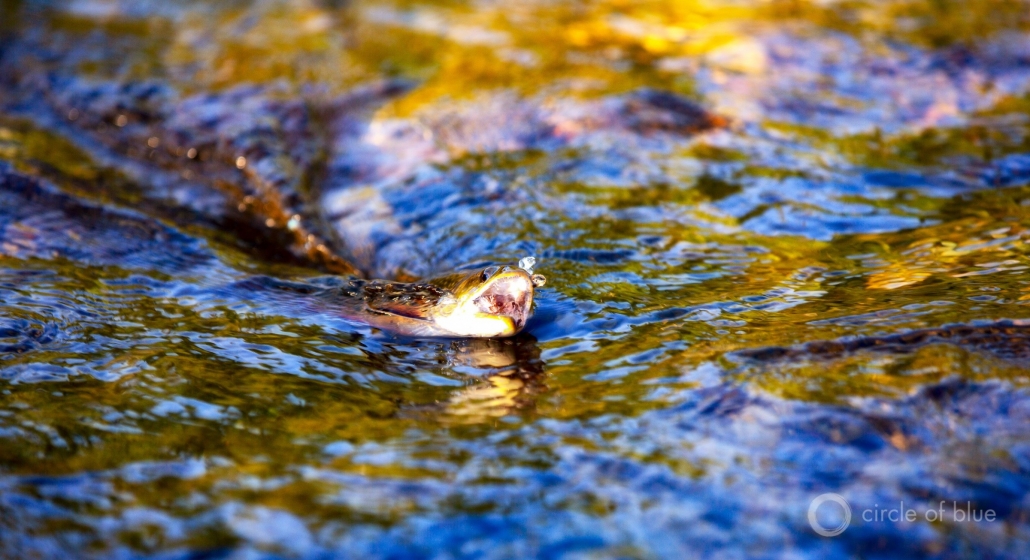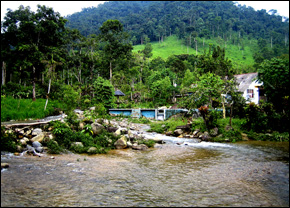Freshwater species and many aquatic habitats are threatened by pollution and climate change, among other factors.

A trout surfaces in Michigan’s Au Sable River, one of the country’s prime trout habitats. Photo © J. Carl Ganter / Circle of Blue
By Brett Walton, Circle of Blue — May 10, 2010
Despite global progress in preserving tropical forests and mangroves, no country will completely meet a 2010 target to reduce the loss of biodiversity, according to an assessment report released by the Secretariat of the Convention on Biological Diversity.
The Convention on Biological Diversity was adopted in 1992 after the Earth Summit in Rio de Janeiro, and ten years later the 192 countries that are party to the convention committed themselves to reduce the rate of biodiversity loss globally, regionally and nationally. The CBD’s report Global Biodiversity Outlook 3 finds that they have not met that goal and in many cases, biodiversity continues to diminish.
This decline is happening as factors inimical to biodiversity are intensifying. The report identified five main areas of concern: habitat change, overexploitation of resources, pollution, invasive species and climate change.
Published every four years, the report noted that several species and habitats were particularly threatened: freshwater vertebrates, corals, amphibians, freshwater wetlands, sea ice habitats and coral reefs. Meanwhile improvements have been noted in mangroves and tropical forests.
Countries failed to meet the target because biodiversity conservation measures are poorly funded and often ignored when infrastructure or industrial projects are designed, the report states.
Protecting biodiversity is essential because it is the basis for many of the ecosystem services nature provides that are beneficial to human life — services such as regulating climate and protecting against flooding. Biodiversity losses could be reduced if governments better understood the value of the ecosystems they are destroying, wrote Achim Steiner, the executive director of United Nations Environment Program, in the report’s foreword.
“One key area is economics,” Steiner wrote. “Many economies remain blind to the huge value of the diversity of animals, plants and other life-forms and their role in healthy and functioning ecosystems from forests and freshwaters to soils, oceans and even the atmosphere.”
To that end, UNEP is promoting a research program – The Economics of Ecosystems and Biodiversity–to help quantify the value of healthy forests and well-functioning wetlands.
Among the program’s early findings is that annual economic losses from deforestation are an estimated $2 trillion to $4.5 trillion, which could be prevented with an annual investment of just $45 billion.
Critics of the CBD say the convention’s structure is the reason the 2010 target was not reached. According to the Canadian-based International Development Research Centre, the convention lacks effective means to monitor and enforce compliance, while countries are allowed to set targets that correspond with national goals and priorities.
In the absence of legally-binding penalties for non-compliance, the CBD uses positive incentives and peer pressure, according to IDRC. But the failure to meet the 2010 target shows the limitations of such methods.
Brett writes about agriculture, energy, infrastructure, and the politics and economics of water in the United States. He also writes the Federal Water Tap, Circle of Blue’s weekly digest of U.S. government water news. He is the winner of two Society of Environmental Journalists reporting awards, one of the top honors in American environmental journalism: first place for explanatory reporting for a series on septic system pollution in the United States(2016) and third place for beat reporting in a small market (2014). He received the Sierra Club’s Distinguished Service Award in 2018. Brett lives in Seattle, where he hikes the mountains and bakes pies. Contact Brett Walton




